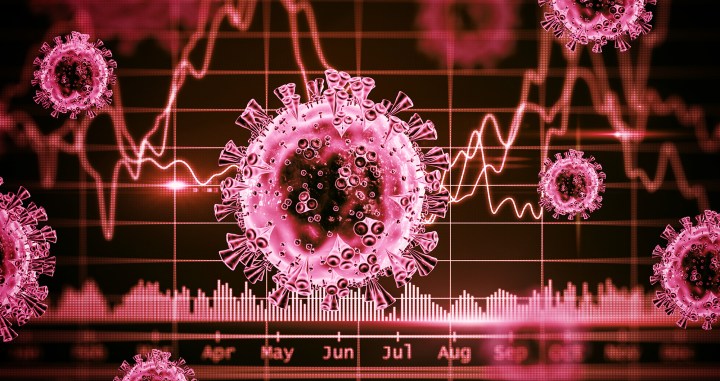CORONAVIRUS
Omicron by numbers – how fast it’s reproducing, and why you can get Covid all over again

Some people were found to have had the disease three times, thanks to the Omicron variant, which evades naturally acquired immunity – but not vaccine-derived immunity.
As Covid-19 cases in South Africa soar and daily positivity rates remain above 20%, the National Institute for Communicable Diseases (NICD) has published its first report on how fast the virus is reproducing, along with data on reinfections.
By the end of April, it was estimated that, nationally, each person infected with the coronavirus gave it to two other people.
In December and January, this number was lower than one. In January it was one, meaning one person infected one other person – and this number remained stable until April.
By 25 April, the national R-rate was two. It was 1.87 in Eastern Cape, 2.4 in Free State, 2.12 in Gauteng, 2.31 in KwaZulu-Natal, 2.09 in Limpopo, 2.09 in Mpumalanga, 2.71 in the Northern Cape, 2.14 in North West and 1.61 in the Western Cape.
The R number rates a disease’s ability to spread, on average, where R is the number of people to whom one infected person will pass on a virus.
In March, a group of South African scientists published a paper in the journal Science, discussing whether subvariants such as BA.4 and BA.5 could be the drivers of a fifth wave of infections in South Africa – despite widespread Omicron infections in December and January.
Lead author Juliet Pulliam from the South African DSI-NRF Centre of Excellence in Epidemiological Modelling and Analysis at Stellenbosch University, wrote that, so far, “our experience with pandemic coronavirus has been that the emergence of new variants is not detected until there has been substantial community transmission”.
The paper details how, early in November 2021, when South African scientists started seeing a number of reinfections in the country, vaccine coverage was still low. Some individuals were found to have had Covid-19 three times.
“The culprit was the rapidly emerging Omicron variant, with multiple mutations in the spike protein. This variant’s chief advantage is its ability to evade naturally acquired immunity. Fortunately, the Omicron variant does not fully evade vaccine-derived immunity, but only those privileged to have been vaccinated can benefit,” the abstract to the paper reads.
Professor Shabir Mahdi, head of Wits University’s Faculty of Health Sciences, published the results of a study he led on infection rates in South Africa from October 2021 to January 2022, when the “original” Omicron virus was the driver of a fourth wave in the country.
Samples were obtained from 7,010 individuals, of whom 1,319 (18.8%) had received a Covid-19 vaccine.
The study found that an estimated 85% of people living in Gauteng had Covid-19 at one time before the outbreak of the Omicron wave in late 2021.
This was the second study done since March 2020.
Professor Cheryl Cohen of the NICD is the lead author of a paper, recently published on a preprint server, to try to understand how South Africans have built up immunity against the SARS-CoV2 virus in the past two years.
Researchers found high cumulative infection rates and durable cross-protective immunity conferred by infection before Omicron. Modelling to predict the future trajectory of the Covid-19 pandemic, however, indicates that, despite the fact that a large fraction of the population has been infected with Omicron, epidemic resurgences are still plausible.
One such scenario is currently playing itself out with the rise of the two subvariants, BA.4 and BA.5.
Professor Alex Sigal and Khadija Khan at the Africa Health Research Institute found, by using blood plasma from 24 unvaccinated and 15 vaccinated people – all of whom had been infected with the original circulating Omicron virus (BA.1) – that, if they added live Omicron BA.4 and BA.5 viruses, the ability of the antibodies in the plasma did not neutralise the subvariants of the virus.
The body’s ability to neutralise the virus was still stronger in vaccinated people.
“BA.4/BA.5 escape, while not as dramatic as Omicron escape from vaccine or Delta immunity, is enough to lead to a new infection wave driven by the subvariants,” Sigal said.
In their latest study, published in the New England Journal of Medicine, professors Glenda Gray and Linda-Gail Bekker found that two doses of the Johnson & Johnson vaccine, given to health workers in South Africa, were effective in preventing severe disease and hospital admission. Despite a high test positivity rate among health workers (about 34%), only 1.6% had been admitted to hospital and 0.5% to an ICU or high care.
The South African Health Products Regulatory Authority (Sahpra) said last week that on 5 May the US Food and Drug Administration (FDA) had revised the approval of the J&J Covid-19 vaccine for use in that country, with specific restrictions. In the US, the vaccine may only be administered to individuals 18 and older, for whom other FDA-authorised or approved Covid-19 vaccines are not accessible or clinically appropriate, and to individuals 18 older who elect to receive this vaccine because they would otherwise not receive a Covid-19 vaccine.
This followed 60 confirmed cases of a rare but life-threatening syndrome of blood clots in combination with low levels of platelets with onset of symptoms one to two weeks after the vaccine.
According to a statement issued by Sahpra, the organisation is aligning its views with those of the World Health Organization and the European Medicines Agency, that the known benefits of the J&J vaccine greatly outweigh the known and potential risks of receiving the vaccine. DM168
This story first appeared in our weekly Daily Maverick 168 newspaper, which is available countrywide for R25.

[hearken id=”daily-maverick/9472″]



















 Become an Insider
Become an Insider
Comments - Please login in order to comment.